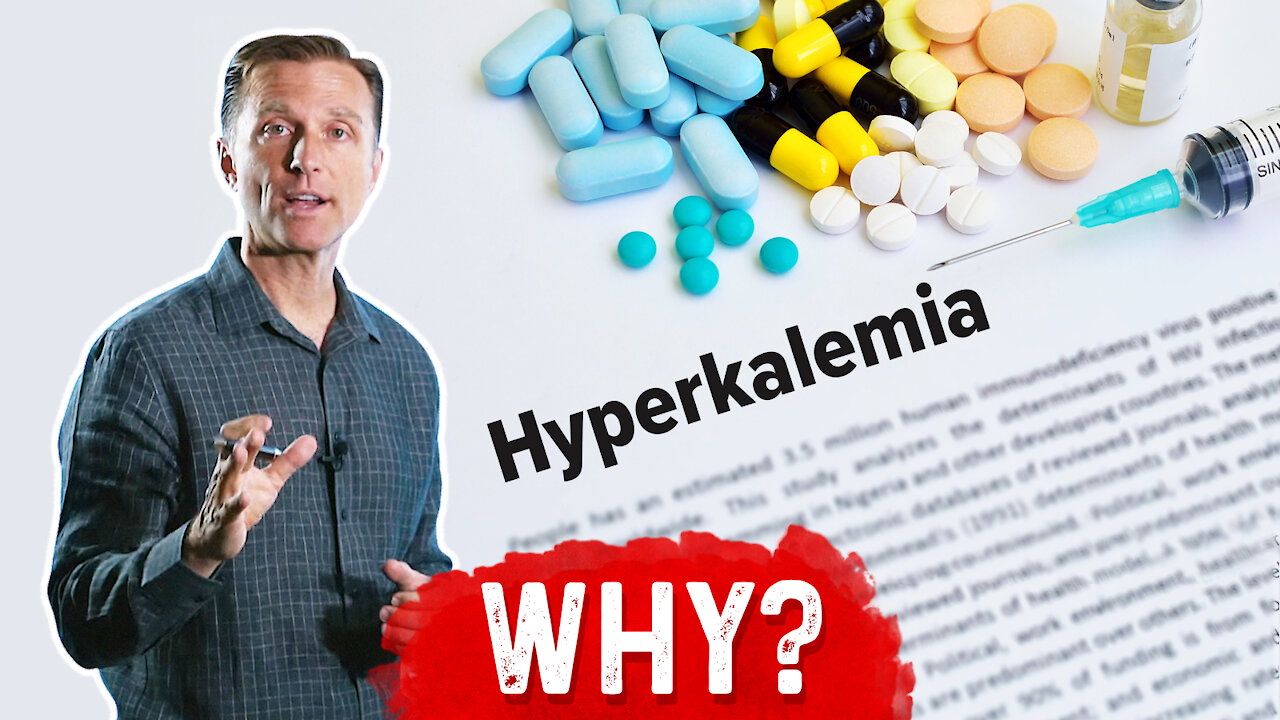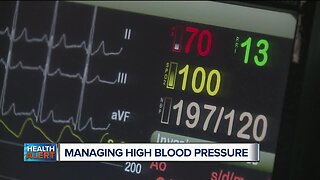Premium Only Content

High Blood Potassium Levels (Hyperkalemia)
Talk to a Dr. Berg Keto Consultant today and get the help you need on your journey. Call 1-540-299-1556 with your questions about Keto, Intermittent Fasting or the use of Dr. Berg products. Consultants are available Monday through Friday from 8 am to 10 pm EST. Saturday & Sunday from 9 am to 6 pm EST. USA Only.
What do high blood potassium levels (hyperkalemia) mean, and what can you do about this situation? Find out.
Timestamps
0:00 High blood potassium levels (hyperkalemia)
1:20 Hyperkalemia causes
2:30 Typical hyperkalemia treatment
3:05 Hypokalemia
3:20 Symptoms of hypokalemia
3:30 Testing for hyperkalemia and hypokalemia
Today we’re going to talk about high levels of potassium in your blood, which is called hyperkalemia.
98% of all of the potassium in your body is actually inside of your cells, not outside of the cells or in your blood. When evaluating hyperkalemia, we’re really looking at just the 2%, so we’re not seeing the whole picture of what’s going on.
Considering that the majority of the potassium is inside of the cell, measuring potassium levels based on the blood may not be a good way to determine if a person has too much or too little potassium. However, there is an intracellular potassium test that I believe is much more valuable.
A few important things about hyperkalemia:
• It’s very rare
• There are very few symptoms associated with hyperkalemia (severe cases may cause palpitations, tiredness, muscle pain, and muscle weakness)
• There is a condition called pseudohyperkalemia (which is basically a false impression that you have high levels of potassium in the blood)
• Excessive intake of potassium is not a primary cause of hyperkalemia
A few causes of hyperkalemia:
• Advanced kidney disease
• Addison’s disease
• NSAIDs
• Certain high blood pressure medications
The typical treatment for hyperkalemia typically involves taking:
• Calcium
• Insulin
• Dextrose
• Sodium bicarbonate
On the other hand, A deficiency of potassium in the blood is called hypokalemia. Hypokalemia is the most common form of electrolyte imbalance when someone is hospitalized.
A few symptoms of hypokalemia:
• Leg cramps
• Weakness
• Constipation
• Abnormal heart rhythm issues
Dr. Eric Berg DC Bio:
Dr. Berg, age 55, is a chiropractor who specializes in Healthy Ketosis & Intermittent Fasting. He is the author of the best-selling book The Healthy Keto Plan, and is the Director of Dr. Berg Nutritionals. He no longer practices, but focuses on health education through social media.
DR. BERG'S SHOP: https://bit.ly/2UzQRRr
Follow us on FACEBOOK: fb.me/DrEricBerg
Send a Message to his team: m.me/DrEricBerg
ABOUT DR. BERG: https://bit.ly/35AE1st
Disclaimer:
Dr. Eric Berg received his Doctor of Chiropractic degree from Palmer College of Chiropractic in 1988. His use of “doctor” or “Dr.” in relation to himself solely refers to that degree. Dr. Berg is a licensed chiropractor in Virginia, California, and Louisiana, but he no longer practices chiropractic in any state and does not see patients so he can focus on educating people as a full time activity, yet he maintains an active license. This video is for general informational purposes only. It should not be used to self-diagnose and it is not a substitute for a medical exam, cure, treatment, diagnosis, and prescription or recommendation. It does not create a doctor-patient relationship between Dr. Berg and you. You should not make any change in your health regimen or diet before first consulting a physician and obtaining a medical exam, diagnosis, and recommendation. Always seek the advice of a physician or other qualified health provider with any questions you may have regarding a medical condition. The Health & Wellness, Dr. Berg Nutritionals and Dr. Eric Berg, D.C. are not liable or responsible for any advice, course of treatment, diagnosis or any other information, services or product you obtain through this video or site.
#keto #ketodiet #weightloss
Thanks for watching! I hope this helps you better understand high blood potassium levels (hyperkalemia).
-
 7:04
7:04
Dr. Eric Berg
16 days ago7 Foods to REVERSE Kidney Damage (Must Watch)
9.93K11 -
 2:57
2:57
WXYZ
4 years agoManaging high blood pressure
134 -
 1:47
1:47
KSHB
4 years agoNeed for blood donations high across the metro
19 -
 0:20
0:20
WFTX
4 years agoOne blood holds blood drive
43 -
 1:01
1:01
Healthprep
4 years agoSymptoms Of High Blood Sugar
12.7K -
 0:58
0:58
KMGH
4 years agoCSU detects 'significantly high' COVID-19 levels in two residence halls' wastewater
7 -
 1:45
1:45
KIVI
4 years agoHigh blood pressure raises COVID-19 risks
78 -
 4:30
4:30
CosmicEndeavors
4 years ago $0.01 earnedVibration Levels
87 -
 2:30
2:30
WSYM
4 years agoHigh Unemployment Levels Continue: Leading to Increase in Scams
15 -
 0:43
0:43
WFTX
4 years agoBlood supplies short
18